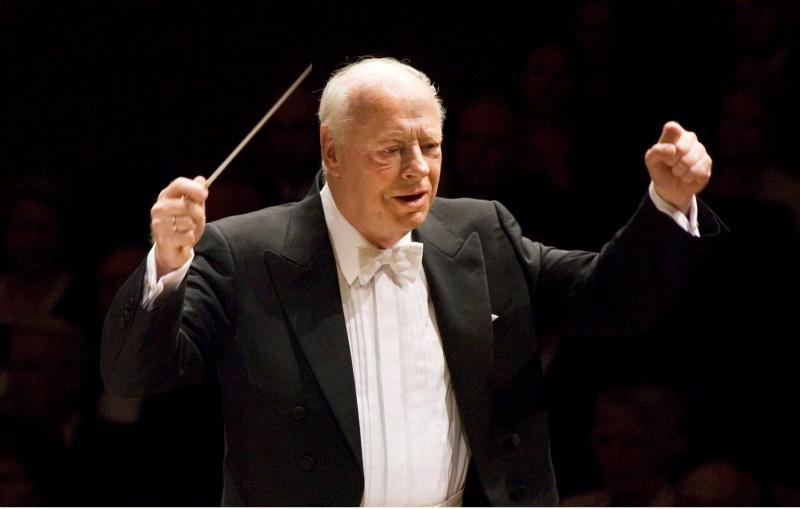Pires, LSO, Haitink, Barbican Hall | reviews, news & interviews
Pires, LSO, Haitink, Barbican Hall
Pires, LSO, Haitink, Barbican Hall
Transcendent Mozart makes up for some rather bogged-down Britten

It’s not that Bernard Haitink’s tempos are universally slow, it’s just that they often feel that way. When it works the music can be magisterial, immense, but when it doesn’t you find yourself chafing against such unyielding allegiance to restraint.
Pires is a transformative pianist – so familiar, so innately right, yet never predictable. She’s the pianist you couldn’t imagine. Mozart is her heartland and the delicate joy of the Concerto No 17 in G major lends itself to her particular gift for simplicity. In her hands Mozart’s innocence becomes infinitely allusive, his melodies ripples that break the surface of something much deeper.
The LSO gave Haitink everything he asked for
This is a concerto from the composer of The Magic Flute and The Marriage of Figaro, lively with dialogue and musical drama. But such squalls as there are are easily resolved, and Pires (pictured below) found a supple balance between dignifying their youthful passions and not over-indulging them, aided by characterisation from the wind principals of the LSO and some deft tempo shifts from Haitink. The whole was poised perfection.
 Haitink and Britten isn’t a partnership that works on paper or in practice. Sounding a lot more like Shostakovich than usual, Britten’s Four Sea Interludes never found their stride, miring the composer’s precise sound-pictures in pedantry and over-emphasis. Some unusual choices in orchestral balance saw Dawn and Sunday Morning painted from different and unfamiliar angles, but the effect was curious rather than revealing.
Haitink and Britten isn’t a partnership that works on paper or in practice. Sounding a lot more like Shostakovich than usual, Britten’s Four Sea Interludes never found their stride, miring the composer’s precise sound-pictures in pedantry and over-emphasis. Some unusual choices in orchestral balance saw Dawn and Sunday Morning painted from different and unfamiliar angles, but the effect was curious rather than revealing.
Beethoven’s Symphony No 7 showed us what Haitink does best. Crafting a long-form musical narrative, his isn’t the minutely-finessed reading of Gardiner or Chailly, but the dramatic trajectory stretches organically from the oboe’s expansive opening right through to the final whirling exit of a tutti, making sense of the contradictory moods of this turn around the symphonic ballroom. Barring a smudged opening brass chord in the Allegretto, the LSO gave him everything he asked, carving deep into the fortes of the Allegro con brio and the string march theme of the Allegretto, before casting intensity aside in a furious dash home, with the brass finally giving way to some rather effective vulgarity.
There’s no danger with Haitink, no risk that you’ll spill over the rails. The result is assured and expensive, glowing with musical effort. If it occasionally lacks thrills then these are easy enough to supplement in London’s orchestral scene; the moments of absolute authority he finds are far harder to substitute.
The future of Arts Journalism
You can stop theartsdesk.com closing!
We urgently need financing to survive. Our fundraising drive has thus far raised £49,000 but we need to reach £100,000 or we will be forced to close. Please contribute here: https://gofund.me/c3f6033d
And if you can forward this information to anyone who might assist, we’d be grateful.

Subscribe to theartsdesk.com
Thank you for continuing to read our work on theartsdesk.com. For unlimited access to every article in its entirety, including our archive of more than 15,000 pieces, we're asking for £5 per month or £40 per year. We feel it's a very good deal, and hope you do too.
To take a subscription now simply click here.
And if you're looking for that extra gift for a friend or family member, why not treat them to a theartsdesk.com gift subscription?
more Classical music
 theartsdesk at the New Ross Piano Festival - Finghin Collins’ musical rainbow
From revelatory Bach played with astounding maturity by a 22 year old to four-hand jazz
theartsdesk at the New Ross Piano Festival - Finghin Collins’ musical rainbow
From revelatory Bach played with astounding maturity by a 22 year old to four-hand jazz
 First Person: Manchester Camerata's Head of Artistic Planning Clara Marshall Cawley on questioning the status quo
Five days of free events with all sorts of audiences around Manchester starts tomorrow
First Person: Manchester Camerata's Head of Artistic Planning Clara Marshall Cawley on questioning the status quo
Five days of free events with all sorts of audiences around Manchester starts tomorrow
 Goldscheider, Brother Tree Sound, Kings Place review - music of hope from a young composer
Unusual combination of horn, strings and electronics makes for some intriguing listening
Goldscheider, Brother Tree Sound, Kings Place review - music of hope from a young composer
Unusual combination of horn, strings and electronics makes for some intriguing listening
 theartsdesk Q&A: composer Donghoon Shin on his new concerto for pianist Seong-Jin Cho
Classical music makes its debut at London's K-Music Festival
theartsdesk Q&A: composer Donghoon Shin on his new concerto for pianist Seong-Jin Cho
Classical music makes its debut at London's K-Music Festival
 Helleur-Simcock, Hallé, Wong, Bridgewater Hall, Manchester review - moving lyricism in Elgar’s concerto
Season opener brings lyrical beauty, crisp confidence and a proper Romantic wallow
Helleur-Simcock, Hallé, Wong, Bridgewater Hall, Manchester review - moving lyricism in Elgar’s concerto
Season opener brings lyrical beauty, crisp confidence and a proper Romantic wallow
 Kohout, Spence, Braun, Manchester Camerata, Huth, RNCM, Manchester review - joy, insight, imagination and unanimity
Celebration of the past with stars of the future at the Royal Northern College
Kohout, Spence, Braun, Manchester Camerata, Huth, RNCM, Manchester review - joy, insight, imagination and unanimity
Celebration of the past with stars of the future at the Royal Northern College
 Jansen, LSO, Pappano, Barbican review - profound and bracing emotional workouts
Great soloist, conductor and orchestra take Britten and Shostakovich to the edge
Jansen, LSO, Pappano, Barbican review - profound and bracing emotional workouts
Great soloist, conductor and orchestra take Britten and Shostakovich to the edge
 Jakub Hrůša and Friends in Concert, Royal Opera review - fleshcreep in two uneven halves
Bartók kept short, and a sprawling Dvořák choral ballad done as well as it could be
Jakub Hrůša and Friends in Concert, Royal Opera review - fleshcreep in two uneven halves
Bartók kept short, and a sprawling Dvořák choral ballad done as well as it could be
 Hadelich, BBC Philharmonic, Storgårds, Bridgewater Hall, Manchester review - youth, fate and pain
Prokofiev in the hands of a fine violinist has surely never sounded better
Hadelich, BBC Philharmonic, Storgårds, Bridgewater Hall, Manchester review - youth, fate and pain
Prokofiev in the hands of a fine violinist has surely never sounded better
 Monteverdi Choir, ORR, Heras-Casado, St Martin-in-the-Fields review - flames of joy and sorrow
First-rate soloists, choir and orchestra unite in a blazing Mozart Requiem
Monteverdi Choir, ORR, Heras-Casado, St Martin-in-the-Fields review - flames of joy and sorrow
First-rate soloists, choir and orchestra unite in a blazing Mozart Requiem
 Cho, LSO, Pappano, Barbican review - finely-focused stormy weather
Chameleonic Seong-Jin Cho is a match for the fine-tuning of the LSO’s Chief Conductor
Cho, LSO, Pappano, Barbican review - finely-focused stormy weather
Chameleonic Seong-Jin Cho is a match for the fine-tuning of the LSO’s Chief Conductor
 Classical CDs: Shrouds, silhouettes and superstition
Cello concertos, choral collections and a stunning tribute to a contemporary giant
Classical CDs: Shrouds, silhouettes and superstition
Cello concertos, choral collections and a stunning tribute to a contemporary giant

Add comment